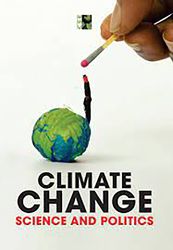Some parts of Climate Change: Science and Politics are simple and others are complex, much like the issue itself. The truth is stark: we are living on a planet that is heating up. But what we have done with that truth is complicated. And that is what this book seeks to address.
It begins with the basics, explaining the earth’s climate system, natural greenhouse effect and the problem of rising emissions. Then it explains at length the impact of climate change on the planet, the history of climate negotiations (from the Earth Summit in Rio de Janeiro to the Paris Agreement and beyond) and how carbon markets operate.
At the heart of the issue is the problem of climate equity. For decades, it has been the industrialised nations which are historically responsible for some 70 per cent of global emissions. Despite their annual emissions slowing down, they have not fundamentally shifted away from a carbon intensive economy. Hence, the developing countries claim that these nations should bear the larger responsibility of repairing the impact of global warming. But they are resisting, “hell-bent on erasing any mention of historical emissions from all texts”.
It is in this context that the push towards net zero assumes importance. The UN Secretary General’s Climate Action Summit in October 2019 saw 65 countries commit to the net zero concept. Many like the US, the UK, Canada and France have set a 2050 net zero deadline. But this is problematic on several levels. Several countries, for one, have not charted a clear roadmap on how they are going to meet the deadline. Others are resorting to carbon trading, but given the lack of rules for this under the Paris Agreement, it may not be the long-term solution.
At places, the book is too niche and might be of interest only to the specialists. Despite this, it is highly informative and a lot of effort has gone into the research and execution. The tone of the book is urgent. As Sunita Narain, the director general of the Centre for Science and Environment, writes in the preface, “Too much time has been wasted in denial, or plain laxity in getting our act together to move at the speed and scale that is needed. We do not have the luxury of time anymore. My generation has squandered the privilege away.”
Perhaps this tone is warranted, given how it underlines the truth that climate change is one issue we cannot remain neutral about. After years of inaction and indifference, we are facing the heat—literally.
Climate Change: Science and Politics
Published by Centre for Science and Environment
Price Rs750; pages 198


